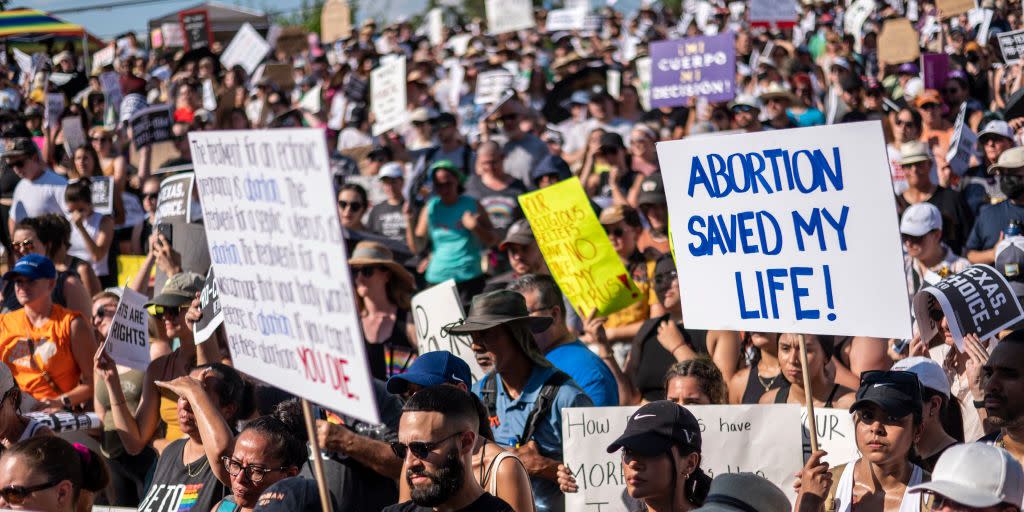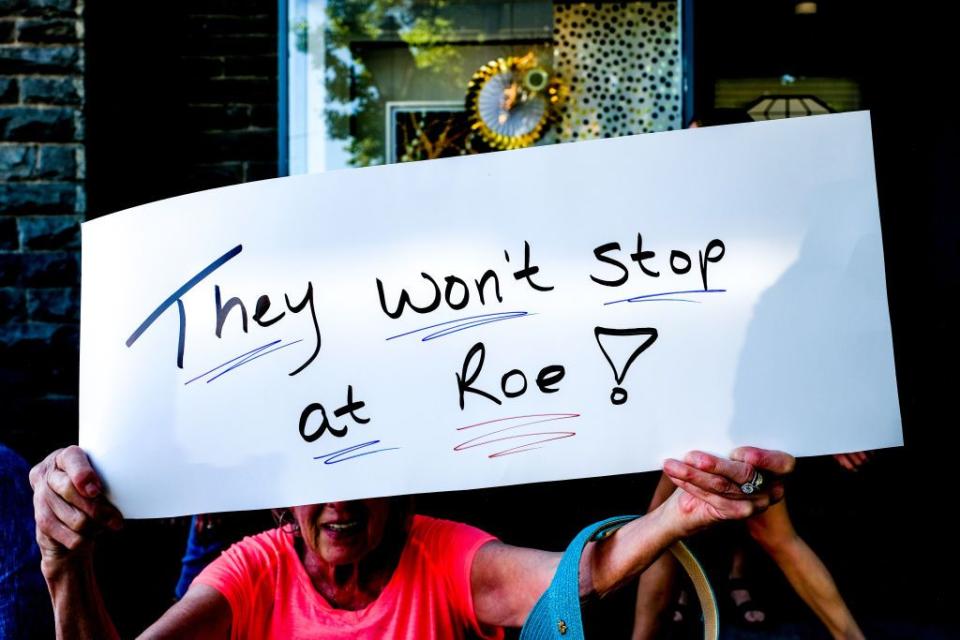I Am a Trans Man. I Had an Abortion. Reproductive Rights Is Everyone's Fight.

- Oops!Something went wrong.Please try again later.
My abortion story, like many others, is one centered around courage and bravery. I am a Black, Southern, non-binary trans man. I was born and raised in Texas and currently live in Georgia. When I was a junior in college I was raped. That night left me with many scars, some that I am still healing from. Six weeks later I found out that I was pregnant as a result of that rape. I was already in a deep depression and the news of being pregnant made me not want to live anymore. You know that sinking feeling of having no way out from the trauma that consumes you? I felt like I had lost complete control of my life and had no decision-making control of my body.
I traveled from Huntsville to Austin (about two hours in the car) to go to the Planned Parenthood around the corner from my mom's house. I chose Planned Parenthood because as a queer person in the South the name recognition let me know I wouldn’t be talked out of getting my abortion. The travel and the planning required to make the trip felt like a necessary burden to reclaim choice in my life and my body. Not only did they help me get my abortion, but they also called a rape crisis center and got me into therapy.
When I heard the news that the Supreme Court Of The United States had overturned Roe v. Wade, ending the constitutional right to abortion, I felt discouraged, hopeless, and full of dread. All I could think about was what would I have done all of those years ago if I had been denied an abortion, which I often say saved my life.
The overturning of Roe v. Wade is a precarious decision made by what has shaped into a dangerous SCOTUS. In a solo concurring opinion, Justice Clarence Thomas says the court should reconsider rulings that protect contraception, same-sex relationships, and same-sex marriage, all of which would be a direct attack on me, my community, and the very freedoms the government otherwise claims I have.
In these moments I often think about what my grandmother used to tell me, “If they come for you at night, they will come for me in the morning.” In other words: if you are not safe, then I am not safe either. That is why this has to be all of our fight. Collectively. All of us.
Reproductive Justice is an abolition issue. It’s an abolition issue because like other systems of harm it seeks to take away our power and our yearning to build a life we deserve. It is a racial justice issue. It’s a racial justice issue because it will disproportionately impact Black, brown, and immigrant people who will likely carry the brunt of being criminalized by their need to seek out reproductive health. It is a queer and trans issue. It is a queer and trans issue because in 2022, when we talk about reproductive rights, my community of queer and trans folks is on the frontlines of this fight while being made invisible around our own access. Poet and civil rights activist Audre Lorde said there is no such thing as a single-issue struggle, because we do not live single-issue lives. That means we have to stop fighting in silos and work collectively to defeat our opponents. Because that is what they are doing.
We have to stop naming this issue a “woman’s” issue. There are more folks than women receiving abortions. I am a trans man and I had an abortion. We exist. We sometimes want families and sometimes we don’t. Abortion is healthcare and healthcare is a human right.

This moment calls for us to be sober about the darkness that surrounds us. Those that oppose my liberation are not shy about what they want—they want to bury us, leave us for dead in the shadows of poverty, fear, and shame. The idea that people should be robbed of their ability to self-determine is rooted in the white supremacist idea that others are entitled to make decisions over our bodies. The fight ahead will require that we are clear that the overturning of Roe v Wade is about more than abortions but rather a systemic issue. The fight ahead requires that we’re clear about our roles in the movement, some of us should build and strengthen abortion funds and care for people, and some of us must come up with a winning strategy that restores full access to abortion. The people that will come up with this strategy are people like me and others that know what it feels like in our bodies to be starved of self-determination.
When you are unclear about how to respond, or act, follow those people; they will be the first to arrive and the last to leave. They will be the ones taking notes and facilitating strategy sessions. They will be the ones that bring creativity and love and joy to this fight. And they will be the ones that ensure that future generations are guaranteed bodily autonomy.
So what can you do now that we live in a post-Roe world? Donate to and volunteer at your local abortion clinic. Visit Abortion On Our Town Terms to get more information on self-managed abortions. If you have had an abortion, tell your story. The power of storytelling is huge. Don’t allow them to scare us into silence. Because as Audre Lorde said, our silence won’t protect us. Dr. Martin Luther King Jr. said: “One has not only a legal but a moral responsibility to obey just laws. Conversely, one has a moral responsibility to disobey unjust laws.” This is our call to action. This is an unjust law and we must disobey.
You Might Also Like

